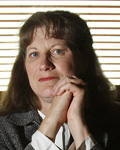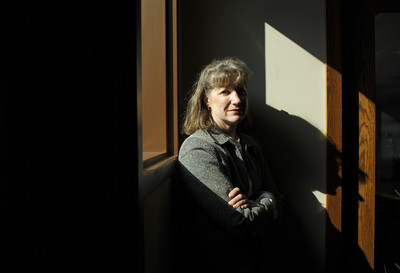‘Message of hope’ on hepatitis
She's one of 99 to test positive for hepatitis C in 2001 because of unsafe injection practices at a Nebraska clinic, the largest such outbreak in the country to date.
On Monday, Evelyn McKnight will share her experiences with Nevadans worried about whether they were exposed to hepatitis C at a local endoscopy clinic that is the focus of a massive public health notification.
"I just want to bring a message of hope,'' said McKnight, 53. "I want people to see me as someone who got a letter and who has walked that path.''
Assemblywoman Sheila Leslie and Dr. Lawrence Sands asked McKnight to testify during a Legislative Committee on Health Care hearing at the Sawyer Building because of her experience and her advocacy organization, Hepatitis Outbreaks National Organization for Reform or HonoReform.
The hearing, which begins at 5:30 p.m., is strictly for the public, Leslie said.
"I want her to lead off the discussion," she said about McKnight. "There's a lot of fear, a lot of frustration and a lot of anger out there. I know people are going to want to express all that, but what I hope to hear are ideas on moving forward. Evelyn can help us.''
McKnight was diagnosed with hepatitis C in 2002 while undergoing what she described as aggressive treatment for breast cancer. It was her second bout with the disease since 2000.
Her previous chemotherapy treatments for breast cancer took place in 2000 and 2001 at a clinic in Fremont, an eastern Nebraska city of about 25,000 just outside Omaha.
As part of the treatment, McKnight underwent a series of medical tests, one of which revealed she had hepatitis C.
"I was shocked," the mother of three adult children said. "My husband was shocked. I didn't have any risk factors. I didn't know where this came from."
Shortly after learning of his wife's diagnosis with hepatitis C, Tom McKnight, a family physician, discovered that four of his patients had the disease and had been treated at the same clinic, the Fremont Cancer Center.
Tom McKnight alerted the Nebraska Department of Health and Human Service's Office of Epidemiology about the cluster. Several other patients were subsequently diagnosed with hepatitis C and had received treatment at the clinic, Evelyn McKnight said.
The cases led to an investigation into the clinic's medical practices.
According to an article about Nebraska's outbreak published in a 2005 issue of the American College of Physicians, the virus is believed to have originated from an infected patient who was treated at Fremont Cancer Center in March 2000.
Interviews with clinic staff revealed that a nurse who had worked there was dismissed in July 2001 because of breaches in infection control practices.
The report says the nurse was reusing syringes on the same person to draw solution from a saline bag. That saline bag was used for multiple patients. Evelyn McKnight said the nurse gave a deposition in which she said the clinic's owner had told her to reuse the syringes and share saline bags among patients.
"He did not come back from Pakistan to testify,'' McKnight said about the owner, Dr. Tahir Ali Javed, who left shortly after it was announced that patients had contracted hepatitis C at his center.
McKnight said Nevada's hepatitis C outbreak is similar to Nebraska's in that it is believed disease transmission occurred when nurse anesthetists reused syringes on infected patients, contaminating vials of medication that were shared by multiple patients.
Nevada officials announced the health alert Feb. 27 after linking six cases of hepatitis C to the Endoscopy Center of Southern Nevada on Shadow Lane.
None of the six patients had a history of the disease. Five underwent procedures on July 25. The other had a procedure on Sept. 21.
Last week, health district officials announced a seventh case of hepatitis C, this one involving a 2006 male patient at the Desert Shadow Endoscopy Center, a Las Vegas clinic affiliated with the Shadow Lane clinic. It is unknown how the patient might have contracted the disease
The Southern Nevada Health District has mailed more than 40,000 letters to patients of the Endoscopy Center of Southern Nevada, urging them to be tested for hepatitis and HIV, the virus that causes AIDS.
Health investigators estimate that 4 percent of the Endoscopy Center's patients will end up testing positive for hepatitis C. But that number would not reflect the number of patients who contracted the disease there, health officials said. The estimate is based on the clinic's older clientele.
Older adults have a higher rate of hepatitis C because they were more likely to have been infected during blood transfusions conducted before regular screening for the disease began in 1992.
In Nebraska, health investigators sent notices to more than 600 former patients of the Fremont Cancer Center to get tested for hepatitis and HIV. Of about 500 who were screened, 99 tested positive for hepatitis C and were linked to the clinic.
Hepatitis C is a leading cause of chronic liver disease in the United States. About 20 percent to 30 percent of those with the disease show symptoms, which include stomach pain, fatigue and jaundice of the skin.
Even though McKnight tested positive for hepatitis C six months before the investigation in Nebraska, she was screened again by the state's health department.
That screening, for her and the other patients, took place at one central location in Fremont. Patients were taken into private rooms and were asked to give a complete medical history to health officials.
Earlier this month, the head of the federal Centers for Disease Control and Prevention called Nevada's hepatitis C outbreak the "tip of the iceberg" nationally.
McKnight agrees with that assessment.
Transmission of hepatitis from health care-related exposures are being investigated in Michigan and New York.
In New York, health officials have notified 11,000 former patients of a Long Island anesthesiologist's office for possible transmission of blood-borne diseases. It is believed transmission occurred because the physician reused syringes on multiple patients.
In Michigan, state health officials have alerted 13,000 patients of a dermatologist who may have exposed them to hepatitis and HIV because of unsafe practices.
According to a news release posted on the Michigan Department of Community Health's Web site, the physician routinely reused sutures, scalpel blades and syringes on patients without proper sterilization.
"Sadly, this is happening across the country," McKnight said.
Though Nebraska prosecutors brought no criminal charges against the physician or the nurse, McKnight and more than 80 other patients sued the cancer center.
They settled for an undisclosed amount.
McKnight, an audiologist, used her settlement money to co-found HonoReform.
The advocacy group, which hosted a national conference in Washington this year, is calling on lawmakers to take action to mandate better infectious disease control in outpatient settings.
"One thing I have done as part of my personal healing is work toward patient safety," McKnight said. "I know everyone is at such a high emotional state right now, but I do want to plant that seed."
Contact reporter Annette Wells at awells @reviewjournal.com or (702) 383-0283.
PUBLIC COMMENTS SOUGHT AT MONDAY FORUM
Nevadans who wish to comment during Monday's public forum at the Sawyer Building will have up to five minutes in front of the microphone, said Assemblywoman Sheila Leslie.
The hearing, conducted by the Legislative Committee on Health Care, will begin at 5:30 p.m. in Room 4401 and will be teleconferenced to the Legislative Building, Room 4100, in Carson City. The meeting will be devoted to public testimony on the hepatitis C outbreak that led to 40,000 people being notified that they need to be tested for hepatitis and HIV.
"It is impossible to tell at this point how many people will attend and want to speak," Leslie said in a Friday news release outlining how the hearing will be conducted.
In addition to Room 4401, Leslie said, five overflow rooms will be available with TV monitors at the Sawyer Building. Anyone who plans to testify must sign in. Written comments also are being accepted, Leslie said.
The Southern Nevada Health District will have a table in Las Vegas with information on the investigation, hepatitis C and related communicable diseases.
"While this is a very emotional issue, we are hoping testimony will focus on potential solutions," Leslie said.
During April's regularly scheduled committee meeting, she said, lawmakers will discuss regulatory changes that may be needed. The committee also plans to look at the structure and procedures of licensing boards and medical personnel training.
Anyone who is unable to attend can view the public forum on the Internet at www.leg.state.nv.us.
ANNETTE WELLS/REVIEW-JOURNAL


















